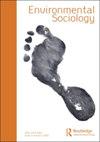Stakeholder perspectives on neglected and vulnerable households in smart grids
IF 2.8
Q3 ENVIRONMENTAL STUDIES
引用次数: 0
Abstract
ABSTRACT Smart grid development is an area where the discussion about who can be negatively affected by low-carbon energy transitions has progressed. The research on vulnerable households in smart grids often focuses on how potentially vulnerable groups react to smart energy technologies. This paper contributes to the literature by highlighting how a broad range of actors in society think about neglected and vulnerable households in smart grids. The research question concerns how stakeholders frame potential inequalities, differentiations, and vulnerabilities in smart grids in Sweden. The frame analysis is carried out, building on interviews with national and local public authorities dealing with energy issues and consumer advice, actors involved in developing, testing, and using smart energy technologies as well as interest organizations representing diverse social groups. Three narratives are identified that frame potentially neglected households as consumers without economic benefits; as users without technological interests, competences, and access to technologies; and as households with intersecting vulnerabilities. It is argued that, since there could be different interpretations of inequalities in smart grids, the governance of smart grids, and specifically discussions of neglected/vulnerable households in smart grids, can benefit from the involvement of a broad coalition of actors.利益相关者对智能电网中被忽视和弱势家庭的看法
智能电网的发展是一个讨论谁会受到低碳能源转型的负面影响的领域。对智能电网中弱势家庭的研究往往侧重于潜在弱势群体对智能能源技术的反应。本文通过强调社会中广泛的行动者如何看待智能电网中被忽视和脆弱的家庭,为文献做出了贡献。研究问题涉及利益相关者如何构建瑞典智能电网中潜在的不平等、差异和脆弱性。框架分析是在对处理能源问题和消费者建议的国家和地方公共当局、参与开发、测试和使用智能能源技术的行动者以及代表不同社会群体的利益组织进行访谈的基础上进行的。本文确定了三种叙事,将可能被忽视的家庭视为没有经济利益的消费者;作为没有技术兴趣、能力和获取技术的用户;作为一个有着相互交织的弱点的家庭。有人认为,由于对智能电网中的不平等可能有不同的解释,因此智能电网的治理,特别是对智能电网中被忽视/弱势家庭的讨论,可以从广泛的行动者联盟的参与中受益。
本文章由计算机程序翻译,如有差异,请以英文原文为准。
求助全文
约1分钟内获得全文
求助全文
来源期刊

Environmental Sociology
ENVIRONMENTAL STUDIES-
CiteScore
4.60
自引率
12.00%
发文量
34
期刊介绍:
Environmental Sociology is dedicated to applying and advancing the sociological imagination in relation to a wide variety of environmental challenges, controversies and issues, at every level from the global to local, from ‘world culture’ to diverse local perspectives. As an international, peer-reviewed scholarly journal, Environmental Sociology aims to stretch the conceptual and theoretical boundaries of both environmental and mainstream sociology, to highlight the relevance of sociological research for environmental policy and management, to disseminate the results of sociological research, and to engage in productive dialogue and debate with other disciplines in the social, natural and ecological sciences. Contributions may utilize a variety of theoretical orientations including, but not restricted to: critical theory, cultural sociology, ecofeminism, ecological modernization, environmental justice, organizational sociology, political ecology, political economy, post-colonial studies, risk theory, social psychology, science and technology studies, globalization, world-systems analysis, and so on. Cross- and transdisciplinary contributions are welcome where they demonstrate a novel attempt to understand social-ecological relationships in a manner that engages with the core concerns of sociology in social relationships, institutions, practices and processes. All methodological approaches in the environmental social sciences – qualitative, quantitative, integrative, spatial, policy analysis, etc. – are welcomed. Environmental Sociology welcomes high-quality submissions from scholars around the world.
 求助内容:
求助内容: 应助结果提醒方式:
应助结果提醒方式:


